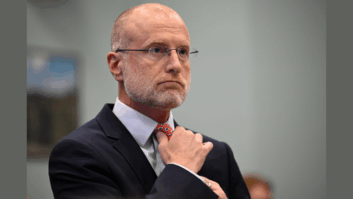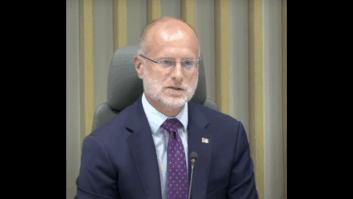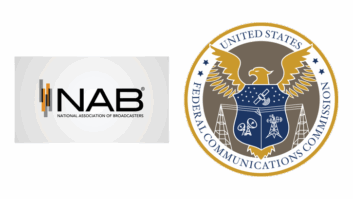FCC Commissioner Michael O’Rielly pinch hit for his fellow Republican Chairman Ajit Pai at this past weekend’s Americans for Prosperity’s 2017 Defending the American Dream Summit in Richmond, Va., and spoke on how the continuously changing landscape of communication technology can play a part in the American Dream.

Michael O’Rielly
O’Rielly said that the internet and other technological advances flourished in America’s capitalist environment because of minimal government disruption. However, he found that not to be the case with the previous, Democrat-led administration. “In recent years, the FCC deviated from this proven formula,” O’Rielly said. “Rather than permitting ‘disruptive’ technologies to continue to develop, the Commission favored regulatory ‘know-it-all-ism.’”
The commissioner, who was in the FCC minority under Chairman Tom Wheeler, says that Pai has begun to “right the course” in part with four areas of focus, what O’Rielly describes as undoing harmful policies; clearing regulatory underbrush; developing and executing a strong pro-innovation agenda; and overhauling the Commission’s processes and its organization.
“All regulations carry costs, which are inevitably passed on to consumers in one form or another, and rules should only be implemented if the benefits outweigh the costs,” O’Rielly stated. “Going forward, this office will help ensure that this simple litmus test is followed.”
Below is the full transcript from Commissioner O’Rielly’s speech:
Looking at the prominence of today’s lineup of speakers, it’s hard not to feel a bit out of place. On one hand, you’ve got nationally recognized leaders – most notably the Secretary of Commerce of the United States – and many of the commonwealth’s most prominent elected officials. On the other hand, there’s me – a Commissioner at the Federal Communications Commission, and a fill-in speaker to boot, as Chairman Pai has to attend to a personal matter and sends his regrets. Thus, you get a shorter, less attractive version of an FCC Republican.
In all seriousness, when you consider the overarching theme of this summit – the American Dream – having a tech policy wonk on the agenda makes considerable sense. So, I am pleased to join you to share some related thoughts.
The American Dream is really about preserving liberty. More specifically, it’s a manifestation of our desire to exercise our God given freedoms – the freedom to go as far as your innate abilities will allow, to build a better life for you and your family, to express your views and beliefs as you choose, and so much more.
Fundamentally, I would make the argument, as do many, that what has produced American prosperity and served as the foundation for the American Dream is our adherence to American capitalism. While opponents try to demonize company executives, decry profits and income, promote class warfare and favor government-provided services over private-sector solutions, I will happily shout the virtues of American capitalism from the rooftops. It should be undeniable that American capitalism connects willing buyers and sellers, minimizes the need for government interference, protects consumers efficiently and sufficiently, facilitates profits and economic growth (meaning jobs), and fosters entrepreneurism. Nowhere is this more evident than the exciting and dynamic communications technology marketplace.
Think about how our daily lives have already been changed by broadband-enabled technologies. If you want to start or grow a business, the Internet can be integral to market products or services to a global audience, not to mention improve operations. If you want to acquire the skills to get ahead in the classroom or the workplace, there are online tools offering state-of-the art instruction. If you want to influence our nation’s leadership, the Internet is the town-square where you can connect with others to engage in policy debates. Americans for Prosperity and its network of 3.2 million members are sterling proof of this fact.
Now consider some of the technological opportunities of the future. You all know about 4G connectivity for your smartphones. Well, the next generation, better known as 5G, is right around the corner, and it brings the promise of a high-speed, high-capacity, seamless wireless Internet experience. It is estimated that such innovations will result in economic benefits to the tune of $500 billion in gross domestic product growth and more than 3 million jobs in the U.S. alone.
The FCC’s job is to provide an environment for such innovation and investment to flourish in the communications technology sector while protecting consumers along the way. Since the earliest days of the commercial Internet, there was bipartisan consensus that the best way to advance that objective was to maintain as minimalist a role for government as possible. The result was hundreds of billions in private network investment, promoting U.S. leadership in digital innovation, unlocking untold benefits for the American people, and further enabling the American Dream.
In recent years, the FCC deviated from this proven formula. Rather than permitting “disruptive” technologies to continue to develop, the Commission favored regulatory “know-it-all-ism.” The result, predictably, has been the creation of market uncertainty, leading to a rethinking of network investment. Consider this for a moment: Internet and wireless growth is exploding before our very eyes as consumers demand more capacity and capabilities. And yet, companies have been hesitant to invest the necessary resources to meet such demands. Sadly, the key data points – what companies would have invested absent Commission regulation, aka the counterfactual – cannot be easily determined, making it difficult to measure the true depths of harm caused by these detrimental policies.
Under the leadership of Chairman Pai, the new FCC has been working to right the course. Shortly before the inauguration, I outlined four general areas where actions could be taken to reinvigorate investment: one, undoing harmful policies; two, clearing regulatory underbrush; three, developing and executing a strong pro-innovation agenda; and, four, overhauling the Commission’s arcane processes and its organization. I’m pleased to say that we’ve seen significant progress on each front.
When it comes to undoing harmful policies, the headline-grabber has been our move to review and reconsider the previous Administration’s so-called net neutrality rules, which subject our 21st-century broadband networks to Depression-era regulations designed for telephone monopolies. This proceeding is still ongoing, and we will go where the facts of the record lead us, but rest assured that the Commission is committed to a free and open Internet, while preserving incentives for network investment.
We are also clearing away the existing regulatory underbrush that diverts resources away from product development, better service, and lower prices. Let me give you just one example of how burdensome the FCC’s rules can be. According to OMB, the cost to private businesses just to comply with the FCC’s paperwork requirements is $800 million a year.
Now, many of the proposed rule changes under consideration may seem inconsequential, but, collectively, they add up. For instance, the Commission is considering two separate and complementary proceedings launched this April to remove barriers to wired and wireless infrastructure investment. These proposals aim to do things like speed decisions by state or local governments on tower siting applications and ease access to utility poles. But, these are the types of rule changes that will accelerate access to 5G networks that enable life-saving innovations, such as remote surgery and vehicle collision avoidance systems. Not to mention, they will allow self-driving cars and other breakthroughs we can’t imagine today.
The Commission is also advancing a pro-innovation agenda through sound spectrum policy. The challenge is that finding additional spectrum for future technologies is not an easy task – fallow spectrum does not exist. The key is putting as many bands as possible on the table to determine whether individually or collectively they can be used for dynamic, new wireless offerings.
And, we are taking steps in this very direction. Last year, the Commission freed up significant swaths of high-band millimeter-wave spectrum and will consider additional bands in the coming months. This move provides U.S. operators a path to be the first in the world to launch next-generation 5G services. And just last month, we voted to explore opportunities for mid-band spectrum, which the U.S. wireless industry has identified given its underutilization by incumbent licensees.
As for improving the agency’s processes, Chairman Pai recently implemented the suggestion that all items to be considered at monthly meetings should be available to the public in advance. What a novelty! Now, you can go online and see what the Commission is considering prior to our final vote, making the Commission more transparent and accountable to you, the people we serve.
Additionally, the Chairman has proposed an Office of Economics and Data to systematically incorporate economics and cost-benefit analysis into the Commission’s policy work. All regulations carry costs, which are inevitably passed on to consumers in one form or another, and rules should only be implemented if the benefits outweigh these costs. This is Regulation 101 – a course the previous Commission must have skipped. Going forward, this office will help ensure that this simple litmus test is followed.
Here’s the bottom line, the Internet is arguably the greatest man-made technology of my lifetime and a testament to free-market principles embodying the American Dream. The government must remain steadfast that this platform should be unfettered by regulation. Doing so is the way to ensure that the economic revolution and expansion of opportunity, unsurpassed in modern history, will continue for future generations and empower their American Dreams.
Thank you very much for including me in this wonderful event. I wish you great success for the rest of the summit.







